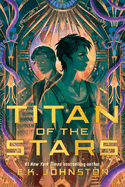
Titan of the Stars by E.K. Johnston (Aetherbound; The Inevitable Victorian Thing) is a tightly plotted, carnage-filled YA sci-fi horror tale that deftly marries the social commentary of Titanic with the visceral horror of Alien.
Celeste and Dominic are both survivors of the "Rupt," a massive earthquake that decimated Canada's Ottawa Valley. Dominic was adopted by an upper-class family, while Celeste grew up in a group dormitory. Now both are aboard the Titan, a spaceship "modern at the core and gilded with early-20th-century affectations" on its maiden voyage to Mars--Celeste as an apprentice engineer and Dominic as a guest whose father designed display cases to hold the "crown jewel" of the ship. Ten years ago, government scientists discovered extraterrestrial life-forms in the melting permafrost of the Canadian Arctic, and now the Titan is home to an alien exhibit. The beings, "dead for millennia," pose no threat to the passengers--until a containment breach releases the actually-very-much-alive creatures and Celeste and Dominic must rely on each other to survive.
This thrilling duology opener is told from both Celeste's and Dominic's first-person perspectives. This shifting POV--combined with cliff-hanging chapter endings and free-verse vignettes that provide mysterious extraterrestrial input--ratchets up suspense and tension. Johnston masterfully infuses the narrative with bone-deep dread and grotesque carnage; phrases like "splash of gore" and "pile of her own sludge" are haunting. It's not all body horror, though: Johnston also effectively intertwines themes of class, privilege, and self-determination. An unsettling, pulse-pounding exploration of societal structures and survival. --Lana Barnes, freelance reviewer and proofreader

